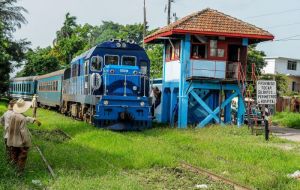
HAVANA, July 16 (NNN-MERCOPRESS) — For the first time since the 1970s, Cuba has new trains rolling on the island after the first train made up entirely of Chinese cars left Havana Friday on a 14-hour, 835-km journey to Santiago de Cuba, the second-largest city on the island.
The local government hopes to develop a large-scale programme for the renewal of the island’s rail system, with the help of Russia and China, over the next ten years.
“Thanks to the cooperative relations with China, today the Cuban transport system can count with the start-up of these trains,” Cuban Deputy Transport Ministry said.
Havana received in May 80 new rail cars made in China that are already in service and another 80 are due next year and so on at a rate of 80 each year from 2019 to 2021, acquired with a Chinese loan payable in 15 years.
The new cars are divided into the air-conditioned first class and TV and the second class with fans and windows.
Each car has a seating capacity of 72. Altogether they offer room for 720 passengers in a railway formation about 325 metres long, something unusual on the island.
Cuba has also signed an agreement with Russia to modernise its railways worth almost 1,000 million dollars, although the details have not yet been disclosed. In 2017, the Russian Railways state corporation (RZD) told Reuters it was also negotiating the installation of a high-speed rail connection between Havana and the Varadero resort.
According to Cuba’s government figures, the railway systed transported 6.1 million passengers in 2018.
The Cuban railway network is one of the oldest in the world. Its first section was launched in the 1830s, making it the first train to run in Latin America. But it currently suffers from lack of maintenance and modern equipment.
The infrastructure in poor condition can not cope with the demand, and the trains often do not work as planned. In addition, passengers sometimes have to deal with the absence of doors or windows, as well as cracks in the seats. The new trains are expected to save travel time, but they will need a restored or constructed track from scratch to move at full speed.
Tickets for the first trip to the eastern end of the island have quickly sold out.
“Undoubtedly this service will transform the transport of passengers in the country,” said Eduardo Hernandez, director of the Railways Union of Cuba (UFC). “With the support of these trains we will improve the service for the whole country.”
Passing through Santiago de Cuba, the new trains will get to Guantanamo on the eastern end of the island, allowing the recovery of a line of 733 km abandoned since 2006 between Havana and Holguin, also in the east. — NNN-MERCOPRESS
